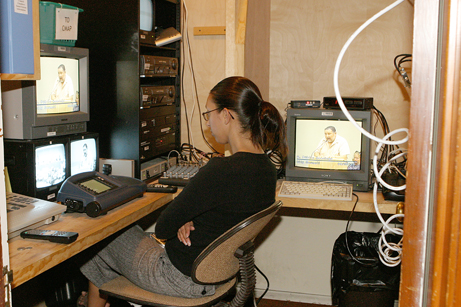
State bill passes, opening the door for phone companies to enter
cable market
CMAP’s fight against a bill that allows telephone companies to
get into the local cable television market ended this week when
state lawmakers overwhelmingly passed the legislation that was
heavily lobbied by AT
&
amp;T and Verizon.
State bill passes, opening the door for phone companies to enter cable market
CMAP’s fight against a bill that allows telephone companies to get into the local cable television market ended this week when state lawmakers overwhelmingly passed the legislation that was heavily lobbied by AT&T and Verizon.
But with the addition of several amendments thrown into Assembly Bill 2987 at the last minute, it’s not clear if the end result is a victory or defeat for the folks who bring local community TV to cable customers of Hollister and San Juan Bautista.
What it means for those city residents who watch channels 17, 18, 19 and 20 is that, eventually, they may not get to watch city council meetings or high school football games as they unravel in real time. According to the director of CMAP (Community Media Access Partnership), Suzanne Saint John-Crane, only time will tell.
“One of the big, big bummers about this is that we’ve had free access to broadcast live in the schools, government centers and libraries, but in 2009, they (local governments and schools) will start getting charged,” Saint John-Crane said.
CMAP’s licensing agreement with local governments ends in December of 2009.
“The biggy which will affect communications for schools and cities is that now they have free access and they don’t have to rent lines from the phone companies,” she added.. “We have 50 sites that CMAP can go live from. So, for example, Hollister City Council meetings – who knows who would have to pay for it when the phone companies step in.”
Since the beginning of the year, the battle over this issue has pitted cable companies and local community access stations such as CMAP against phone giants AT&T and Verizon. For several decades cable TV companies, such as Charter Communications, have had to negotiate separate franchise agreements with local governments. The bill, which now awaits Gov. Arnold Schwarzenegger’s signature, allows the phone companies to enter the market by granting them a single statewide franchise license.
Lobbying efforts on this legislation set a surreal bar in campaign contributions and “perks” provided to politicians in both mainstream parties, say observers. Reports posted by the Secretary of State’s office show that in April, May and June, AT&T and Verizon spent $19.7 million to influence the vote on AB2987.
Some of the “gifts” given were blatant, say opponents, and included wining and dining lawmakers at the Monterey Aquarium. According to a report in the San Francisco Chronicle, the phone company also footed a $1,238 bill for a Lakers basketball game and refreshments, enjoyed by Senator Martha Escutia (D-Whittier) the Chairwoman of the Senate’s Energy, Utilities and Communications Committee, her husband and two sons. The lobbying reports are on record with the Secretary of State’s Office.
The one giant corporation on the other side of the issue was ComCast, which spent $3 million in lobbying against the bill – and bought basketball game tickets for lawmakers. But ComCast and others in the business realized the fight was futile when late last month the Assembly passed the bill unanimously, 77-0. As the bill made its way to the Senate, the cable industry switched sides after negotiating an amendment that allows cable companies to get in on the same deal offered to phone companies: to cancel their local licenses and gain a state franchise if phone companies begin service in their regions.
At one point, the bill had sprouted 209 amendments, according to Deanna Sessums, spokeswoman for the Monterey Bay region of the League of California Cities, whose organization fought hard against the new law because it strips local governments of control over their agreements with cable companies. Sessums believes most lawmakers didn’t understand it.
“Do our legislators even know what they’re voting on?” Sessums said, before the Senate voted 33-4. When it went back to the Assembly, it passed again 64-5.
Saint John-Crane, however, is grateful that two final amendments were added: one allows current cable station operators like hers to spend their funds on operating costs instead of only capital costs; and they can keep their level of funding in perpetuity – beyond CMAP’s expiration date of December 2009. After that, it’s hard to say, she said, what direction the phone companies will force CMAP to take.
“We won’t have a capital budget or the ability to negotiate with the cities, so we’re going to have to become a lot more resourceful in buying cameras and stuff like that,” Saint John-Crane said. “But I think it will work for us and allow us to keep our doors open.”
At least until the end of 2009.









